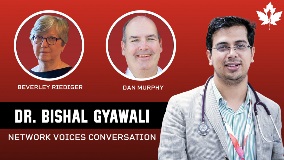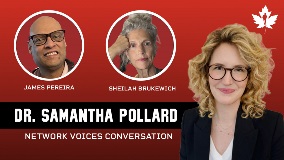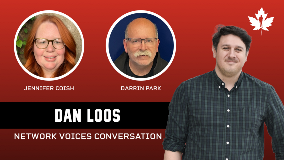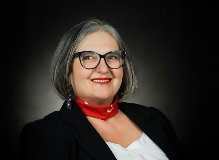Meet the Team Canada of Cancer Research: A Q&A with Dr. Sachin Katyal
“The Network is enabling (even forcing!) researchers and clinicians together in a concerted way to communicate, innovate and action personalized cancer treatments,” says Dr. Sachin Katyal, institutional lead for CancerCare Manitoba, in our latest Q&A

Dr. Sachin Katyal’s journey into cancer research was fuelled by a fascination with the inner workings of life—how cells, organs and entire systems function and what makes them stop working as they should. He quickly became captivated by the mechanisms of oncogenesis – the processes which cause cancer – eventually choosing a career in research over medicine.
Today, his research focuses on understanding DNA repair mechanisms in cancer cells, aiming to develop treatments that can overcome cancer resistance and improve patient outcomes. Beyond the lab, Dr. Katyal is dedicated to advancing precision oncology for the benefit of cancer patients through his roles at CancerCare Manitoba, the University of Manitoba and the national Marathon of Hope Cancer Centres Network.
In this Q&A, he shares his insights on the challenges and rewards of cancer research, the importance of collaboration, and the enduring inspiration of Terry Fox in the fight against cancer.
We hope you enjoy this Q&A as much as we did.
MOHCCN: Why did you become a cancer researcher? Was there a particular moment or experience that led to this decision?
SK: I have always been fascinated with cells, organs and life; curious as to how things are organized and what makes us tick. I was fortunate enough to start my earliest health research experiences in the lab of Dr. Roseline Godbout (Cross Cancer Institute), who runs both a developmental neurobiology and neuro-oncology research programs. During my summer student days, I learned how things are meant to be (how we develop) how things go awry (how dysregulation leads to oncogenesis). These were in the days where we knew about oncogenic and tumour suppressor mutations, but before the current genomics era, and I so learned the old-school elegant techniques in molecular, cell and developmental biology through the lens of oncogenesis. I really meant for this learning experience to be a steppingstone into a career in medicine. However, as I got into my research, I “caught the research bug” and knew that I wanted to make a career out of research and proceeded to continue through with a PhD and make this into a career.
Cancer research is difficult: progress is slow and for every step forward there may be quite a few steps backwards or sideways. What inspires you to keep going? What life lessons have you learned through cancer research?
I always joke that we spend 90% of our time in the “re” phase of “re-search” and only 10% in the “search” phase. However, it is that discovery during that 10% “search” phase that makes it all worth it. Finding something new or untangling unexpected results along with that “a-ha” moment really gives me a rush! That “oh wow, that’s really cool” moment is indescribable but keeps me going day and night (along with a lot of coffee). What I have learned over the years is that research requires hard work, dedication, perseverance, common sense, a little (sometimes a lot of) luck and good mentors – both having good mentors and being a good mentor.
How would you explain your current research focus to a cancer patient or their family member?
Our work seeks to understand cellular DNA damage repair both in normal cells and cancer cells. DNA is the blueprint of our cells – a sort of instruction manual for our cells to operate, grow and survive. All cells have developed the innate ability to repair DNA damage, which every cell in our body incurs daily from the air we breathe, the food we eat, the sun above or the radiation from the ground or the chemicals we are exposed to in the air, our schools, homes or where we work. This repair mechanism keeps the DNA in our genome intact (preserves the instruction manual) so that our cells continue to thrive and function. Without this repair, our cells would either die or become diseased. When an individual is stricken with cancer, our efforts to kill cancer cells may use chemotherapy or radiation therapy to overwhelm the cancer cell with more DNA damage than it can repair so that cell dies off. Unfortunately, some cancer cells often develop a supercharged form of DNA repair, which enables them to resist this treatment-based damage and still survive. These surviving cells can be one source of cancer recurrence and resistance. My research seeks to understand how and why cancer cells develop this hyperactive DNA repair and find ways (drugs) to specifically resensitize these cells to treatment.
The MOHCCN team-based project I co-lead with a number of collaborating scientists and clinicians seeks to evaluate the molecular characteristics of individual patients’ cancers, particularly from those patients who are stricken with highly aggressive forms that have poorer outcomes/difficult to treat and use a data- and AI-driven strategy to match patients to clinical and/or drug trials earlier in the patients’ journey. We will look at the patients’DNA, RNA and protein expression profile (multi-omics) to identify a personalized approach to potentially alter the patients’ treatment and trajectory.
What impact do you hope your research will have on cancer treatment and the outcomes for patients?
It is a very exciting time where research and medicine are really coming together where we can say “research is care”! We have now gained enough knowledge and understanding where personalized multi-omic research findings can be used to guide patient treatment decisions. Collectively as cancer researchers, we now have: a more comprehensive molecular understanding of tumours, developed innovative treatments options and clinical trials, can detect cancers earlier through early screening and advanced imaging, new advances in health information, bioinformatics and the advent of artificial intelligence, all of which enable us to take a personalized approach to helping and treating individuals stricken with cancer. Not only are there curative approaches, but we are now able to manage cancer as a long-term disease with improved quality-of-life thus allowing patients to survive longer to take advantage of the newest and latest and greatest treatments that are continually discovered. The hope is that our team-based approach will improve patients’ lives by corralling all these innovations into cutting-edged personalized research-informed care. Each cancer patient is an individual with their own distinct tumour/cancer and we hope to use individualized research data findings towards a more precise way to treat each patient’s cancer instead of use a typical broad “one-size-fits-all” approach. We also hope to empower patients with their data and research-driven treatment options so that they can make informed decisions as to which drug/clinical trial they may wish to pursue versus standard-of-care options.
Just like Terry Fox united Canadians nearly 45 years ago, the Marathon of Hope Cancer Centres Network is uniting researchers, clinicians, patients and administrators from cancer treatment and research institutions across Canada to accelerate precision medicine. How important is this collaboration and what impact do you think it could have on cancer research and treatment?
This new Manitoban research team, spanning disciplines of fundamental and clinical research and medicine would not have been formed without the Terry Fox MOHCCN program. It is truly a unique initiative that provides funding, opportunity and resources that enables researchers to imagine ideas into reality, foment new research relationships and collaborations, and interconnect with other researchers, cancer hospitals and institutions throughout Canada and the world. The Terry Fox program is enabling (even forcing!) researchers and clinicians together in a concerted way to communicate, innovate and action personalized cancer treatments one person at a time – at a National level.
If a researcher, clinician, patient or donor asked you why the Marathon of Hope Cancer Centres Network is important, what would you tell them?
The MOHCCN is a unique initiative that realizes and enables the future of cancer research and treatments today and brings these to the doorsteps of Canadians stricken with cancer across the country.
What does Terry Fox mean to you? How does Terry inspire you?
Terry is an icon. He was the living embodiment of dedication and perseverance and representative of the typical good old fashioned “stubborn-Canadian-who-refuses-to-quit” spirit. He was young, inexperienced and didn't have a fancy University education – yet he is arguably one of most consequential cancer research innovators of any generation as his legacy has and continues to leave an indelible impact on the Canadian cancer research landscape. Many/most major cancer research findings originating from Canada has some sort of link to the TFRI, whether through its grants, research programs, initiatives or collaborations. It is with that spirit, as Canadian researchers, we continue to also stubbornly work towards Terry’s mission!
* Sachin Katyal, PhD is the MOHCCN Institutional Lead for CancerCare Manitoba and is part of the MOHCCN Steering Committee and the Network’s Canadian Spectrum Working Group. He also leads an MOHCCN Cohort. In addition to his role in the Network, he is also Associate Professor at the University of Manitoba’s Department of Pharmacology and Therapeutics; a Senior Scientist at the Paul Albrechtsen Research Institute at CancerCare Manitoba and Director of the Manitoba Tumour Bank at CancerCare Manitoba, amongst other appointments.
Related Team Member
-
Sachin
MOHCCN Steering CommitteeInstitutional LeadProject LeaderResearcher
Katyal
Related Project
-
Regional Consortia
Prairie Cancer Consortium
- Alberta
- Manitoba
- Saskatchewan
The overall vision of the PR2C is to create a collaborative, inclusive, equitable, and sustainable multiprovincial initiative that works towards developing new treatment strategies for patients facing...Read more
Related News
-

Network Voices Conversations: Dr. Bishal Gyawali
Patient Working Group members Beverley Riediger and Dan Murphy speak with Dr. Bishal Gyawali about common sense oncology. -

Network Voices Conversations: Dr. Samantha Pollard
Patient Working Group members, James Pereira and Sheilah Brukewich, chat with Dr. Samantha Pollard about why patient values should be at the centre of precision oncology. -

Network Voices Conversations: Dan Loos, Biobank NL
In this episode, Patient Working Group members, Jennifer Coish and Darrin Park, chat with Dan Loos, the coordinator of BioBank NL, about all things biobanking. -

Q&A with Dr. Sevtap Savas: Collaborating with patients to transform cancer research
Dr. Sevtap Savas is a contributor to the MOHCCN’s Atlantic Cancer Consortium (ACC) working on a project focused on colorectal cancer while also leading the Patient Advisory Committee which helps guide...









